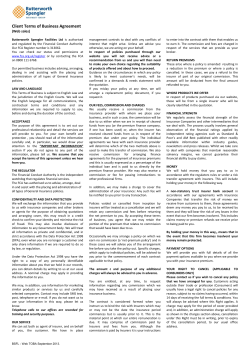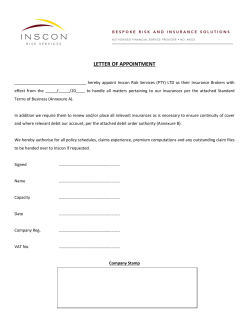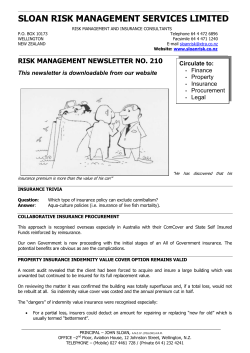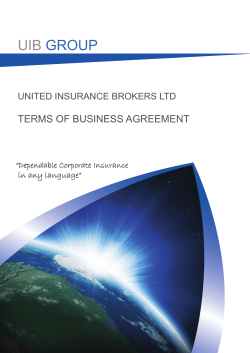
Professional Indemnity Insurance Guide for FCA
Professional Indemnity Insurance Guide for FCA Regulated Firms (2015) Nathan Sewell, CEO of Protean Risk, answers the Top 50 questions we are regularly asked as a specialist provider of Professional Indemnity Insurance to FCA Regulated Firms. Protean Risk is a specialist insurance broker working with investment, financial services and technology firms. Our focus is on creating individual insurance solutions for directly authorised FCA regulated firms, Appointed Representatives and those undergoing authorisation. 1 What is PI? Professional Indemnity Insurance (PI or PII) is designed to protect an individual or a business in the event of a customer or client making a claim for financial loss against them as a result of non-performance, breach of duty of care or professional negligence. 2 Which firms need to purchase PI? In simple terms, any business providing services to third-parties should consider having PI in place. In many cases the FCA dictates that firms purchase PI cover. Some firms consider that they are lower risk and as such may wish to avoid the cost of PI cover. Even if it is not a compulsory requirement, appropriate insurance protection will help in protecting the value of a business, should the unfortunate event of a claim occur. Given defence costs and expenses are part of the cover, even a spurious claim can be defended and insurers’ involvement can assist in preserving valuable management time. A customer or client may insist that you have PI (and any other appropriate insurance) in place, as a condition of doing business and often as a contractual stipulation for certain businesses. 3 Is it an FCA requirement to put PI in place? It is a compliance requirement for most FCA regulated firms to implement PI insurance. These include IFA’s and other types of intermediaries in different sectors. Additionally, for some firms such as ‘Exempt CAD’ investment firms then PI insurance can be used to reduce the regulatory capital requirement down to a lower amount plus PI cover. Firms without adequate PI insurance as stipulated by the FCA would be considered to be in breach of their capital requirements, which would lead to immediate sanction by the FCA if discovered. 4 Why does the FCA require firms to hold PI cover? The FCA states “it provides an additional financial resource from which firms can pay justified claims. And it can help to prevent insolvency and excessive claims on the Financial Services Compensation Scheme, which is funded by firms which are still trading.” 5 We do not hold client money, do we still need PI? Whilst there are risks that relate specifically to holding client money, all other risks related to the provision of professional advice and services remain. 6 If a firm is currently an Appointed Representative (AR), will the PI policy be suitable once the firm is Directly Authorised? When the policy is put in place for the AR, it should be made clear to the insurer that the firm may consider direct authorisation. If this is the case, there should be no reason why the policy would not continue for the firm once directly authorised. The premium is usually similar for Appointed Representatives and Directly Authorised firms. 7 How much does it cost? The cost of PI can vary greatly and depends on a number of factors. It is best to speak to a specialist provider, who should be able to provide an estimate of cost, based on a few headline data points. Q17 gives more information on the rating factors used by insurers. 8 Which insurers typically offer cover for FCA Regulated Firms? The insurers for FCA regulated firms tend to be specialist providers. In the main they are London Market or Lloyds underwriters, although not exclusively. 9 How long does it take to put cover in place? Generally speaking it is useful to allow a period of 2 to 3 weeks to put the policy in place. This allows the broker to carry out the appropriate amount of marketing, compare premium & conditions and to make recommendations. This timeframe is in addition to the decision making process of the customer or client. 10 What information is required to get a quotation and why? It is important to make the distinction between getting an estimate (or indication) of cost and getting a formal quotation. If you merely need an estimate, a quick call with a specialist broker should enable that to be provided. A formal quotation is typically a firm offer of cover from insurers pending satisfaction of any subjectivities. Typically your broker will provide you with a proposal form for completion. This summarises the main aspects of the firm’s activities and is the key piece of information for insurers to underwrite the risk. In additional you may need to provide information such as: Management CVs; Extracts from your FCA business plan (for newer firms); Report and Accounts; Client marketing materials; Prospectus documentation for investment firms; Investor reports. It is essential that the proposer (when seeking a quotation, taking out or renewing an insurance) discloses all material facts to insurers. A material fact is one that is likely to influence the judgement of an insurer in fixing the premium or in determining whether to accept the risk. The proposer should ask other senior members of the firm when completing the form to confirm that the statements made are accurate and representative of the whole firm. 11 What could be the impact of not supplying full information? At one end of the scale, deliberately not supplying material facts can lead, in the worst case scenario, to insurers denying a claim and voiding the insurance policy. At the other end of the scale, insurers are moving more towards technical underwriting, with the increasing use of complex ratings tools to ensure that the premium is appropriate for the risk. When no answer is provided to a question, the rating tool assumes the worst case scenario, thus potentially negatively impacting the resulting premium. 12 Should I use a specialist broker? The insurance market views this sector as “specialist” and, as such, the choice of insurers in the London Market is more limited. By using a specialist broker, you can gain full access to those insurers and to a more bespoke, or tailored policy, offering. Pricing efficiencies are also created by the higher volumes of trading between those special brokers and insurers. 13 What process will the broker go through to obtain the best terms? The broker should collate the information above and provide an underwriting submission to insurers. Ideally this exercise should encompass a number of different insurers, to ensure competitiveness. If you work with a broker that isn’t particularly tied to one or two insurers (as some are – you should ask the question) then you should not need to ask more than one broker to provide quotations. Specialist brokers servicing FCA regulated firms should be able to provide you with comfort on this point. At Protean, we work hard to promote the most positive aspects of the risk to underwriters, highlighting the salient points and adopting a personal, open-market approach with insurers. 14 How are brokers remunerated for their services? Brokers can be paid either via a commission from insurers or by a fee from a customer or client. Occasionally it might be a combination of both. In most cases, apart from larger firms, brokers will be paid on commission. 15 Will our insurance be “marketed” at each renewal to ensure it remains competitive? Whilst it is beneficial to check premium competitiveness regularly, it can be counter-productive to do this every year. This is best to be discussed with your broker prior to each renewal. 16 Is the same information required for renewal? Usually less information will be required for renewal and this may be limited to a new proposal form, report and accounts and claims information. 17 What are the main factors on which the premium is based? For regulated firms, that main factors influencing premium are: 18 Business activities; Type of clients (eg. Corporate, High Net Worth or Retail); Geographical scope of activities; Revenue size (by geography); Claim history; Policy excess. Our clients are professional investors and institutions, how will this affect the premium? Insurers will look more favourably where the firm does not have an exposure to retail customers. 19 What limit of Liability is required? In some cases the FCA will stipulate a minimum policy limit (for example, if the firm is an insurance intermediary, then the minimum limits of indemnity are: (1) for a single claim, €1,120,200 ; and (2) in aggregate, €1,680,300 or, if higher, 10% of annual income up to £30,000,000). Otherwise it is a case of looking at the scale of the firm and the activities carried out. Your insurance broker would also be able to help in this area, particularly in providing industry benchmarking information. Note: the FCA quotes these figures in Euros. 20 How does the policy limit work? In the vast majority of cases, the limit is an aggregate amount, inclusive of all costs and expenses. This amount applies over and above any policy excess (also known as a deductible). In some instances, cover may be provided on an each claim basis, so that the limit would apply in each separate claim. Under many forms insurance, the payment of a claim reduces an aggregate limit by the amount of the claim. Provision is sometimes made for reinstating the policy limit to its original amount when the original limit has been exhausted. Depending on policy conditions, it may be done automatically, either with or without premium consideration (i.e., a reinstatement premium), or it may be done only at the request of the insured in return for an additional premium. There are also certain extensions that may have their own separate limit. 21 What is the difference between “Aggregate” and “Each & Every Claim”? For regulated firms, policy limits are typically “Aggregate” (either including claim costs and expenses, or with costs and expenses in addition to the limit) but on occasion an insurer might provide and “each and every” costs limit. This means that the policy limit would effectively be reinstated and thus available for any subsequent claims. Importantly, those must be entirely separate, unrelated claims. 22 Can the limit be increased during the period of insurance? Yes, the limit can be increased, usually dependant on claims activity. Mid-term limit increases occur typically where a firm is growing quickly, or where a client insists on a certain minimum level of cover. 23 Will there be an excess on the policy? Yes, in all cases some kind of policy excess would apply and in 99% of cases this excess would apply separately to each claim and even each claimant, depending on the firm’s activities. 24 How does the excess work? The excess is an amount (of each claim) that the firm must bear at its own cost. Importantly, policies require claims to be notified (subject to the specific notification provisions on the policy) even if the cost of the claim is within the amount of the excess. 25 What is the relationship between the premium and the excess? Within reason, increasing the policy excess will lead to a premium saving. This is not scientific, in the sense that the proportionate saving will differ, depending on the circumstances. 26 What happens to the cost as the policy limit increases? Generally speaking, whilst the premium increases as the policy limit is increased, the incremental cost reduces significantly. So for example, £5m of cover would cost a little more than double the cost of £1m. Sometimes insurers have minimum premiums to apply for each limit, so this is only a general rule of thumb. 27 Will the premium increase in line with our revenue? Generally speaking yes, although the incremental increase will reduce as revenue increases. 28 Will premium increase if we aren’t making a profit? In some cases yes, if the lack of profit is an indicator that the business is not performing well over the medium/long term. For early stage business it is a factor that would be taken into account when the policy is put in place. 29 Can the premium be paid on instalments? Yes, it is usually possible to arrange premium finance via your broker. 30 What are the minimum/maximum policy periods? Typically the policies are written on an annual basis. Generally speaking the minimum period would be 9 months and the maximum 18 months. 31 Can the policy be cancelled? Whilst most policies do not contain an explicit cancellation provision, market practice allows for policies to be cancelled in most cases. Certain conditions will apply, such as an additional charge (above the pro-rata premium used) or a return premium, being net of the broker’s commission. 32 What are the main exclusions? Professional Indemnity policies exclude risks that the insurers are unable or unwilling to cover, the most notable for Professional Indemnity are claims involving strict liability, contractual liabilities and guarantees, which are not subject to the test of negligence; fines, penalties and liquidated damages (including contractual penalty clauses); bonding liabilities (for which separate covers are available). 33 Can cover be provided for claims outside the UK? Yes, cover can be provided on a worldwide basis. In general terms, the inclusion of North America brings the highest premium loading. 34 Can cover be provided for work carried out in USA? In most cases, yes. Some insurers are not keen to underwrite risks with USA/Canada exposure and/or certain specific terms might be imposed (such as a higher excess or additional premium) but it should not present a problem. 35 We are an investment and trading business, will the PI cover us for trading errors? The answer in most cases is yes. If you have either an instruction to carry out or are making a discretionary trade on behalf of a customer or client, this error constitutes a breach of professional duty and thus would be covered, should it lead to a financial loss to your customer or client. This is an area where it pays to reads the small print! 36 What activities are considered to be high risk? Advice provided to retail customers or clients is typically regarded as one of the highest risks given the ease of recourse by individuals facilitated through the Financial Ombudsman Service (FOS). 37 What claims are covered? PI policies usually cover Costs, Expenses, Settlements and Damages incurred in defending and settling claims alleging breach of professional duty by the business or firm. For this reason, most claims are brought by customers or clients. 38 Are costs and expenses for FCA investigations covered? For regulated firms, the cost of legal representation should form part of the cover. It is important to consider what policy excess and/or cover sub-limit might apply. 39 Will there be a “no claims discount”? Generally speaking, no. In certain cases insurers may agree some kind of a no claims discount upfront. This might be for firms perceived as more high risk and/or firms in their early stages. Notwithstanding these comments, once a track record has been built up, insurers may recognise this in premium reductions at renewal. 40 How would a claim affect my premium? The impact on the renewal premium of a claim would depend on the severity and nature of the claim. Insurers look at the claim event and assess whether it is an isolated one-off event or a systemic failure. Insurers will also consider whether the insured has changed their risk management procedures as a result of the claim. If there are a number of smaller claims then insurers may look to increase the excess/ deductible on the policy. 41 What is the claims notification process? This process can vary slightly but it is important to note that most policies require you to promtly notify insurers in the event of a circumstance that might lead to a claim. It is important to make the distinction between this and an actual claim event. If in doubt it is best to contact your insurance broker who will be able to advise you and notify your insurer if appropriate. 42 Can I choose my own lawyer in the event of a claim against me? Even though there is often a policy excess (also known as a deductible) to be borne by the firm before insurer’s liability kicks in, typically you would notify a circumstance and then a claim, regardless of potential quantum. At this point, you would seek approval for your preferred legal representation which, provided it was reasonable, would typically be approved. 43 What other insurance might we consider? In terms of protecting the liabilities of the business, there are other covers to consider, such as Cyber/Data Protection Insurance. Often the most valuable assets of a firm, particularly in Financial Services, are the people that work in the business. Consideration should be given to how these risks are dealt with from the perspective of the firm and also the individuals themselves. 44 Should Directors’ Liability (D&O) Insurance be put place at the same time? Directors’ Liability (D&O) insurance protects the personal liability of directors and other senior partners or managers. As such, there is often a desire to ensure that individuals are protected. It can prove cost effective to purchase a combined PI/D&O policy. 45 Is the underwriting information required the same as for PI? If you have provided full details for PI cover, that should be sufficient to obtain a quotation for a D&O policy. 46 Are the insurers the same? The insurers for D&O are most often the same as the insurers for PI. It is considered beneficial to have both policies with the same insurer and the same renewal date. 47 Is it possible to combine the policies for PI and D&O? What would be the advantages? Yes, insurers do market joint policies. The benefits include simplicity of purchase, that there are less likely to be gaps in coverage and, potentially, pricing. 48 How much does D&O insurance cost? D&O cover can cost as little as £500 but would typically be between £1,000 and £5,000 depending on the limit of liability and specifics of the risk. 49 Should I buy Employer’s Liability Insurance in conjunction with PI? The government issues guidelines on when this cover is required. In broad terms, once you have employees (either contracted, full or part time) you should have Employer’s Liability and Public Liability Insurance. 50 How much does it cost? Employer’s and Public Liability insurance is usually provided as part of an Office Insurance package policy, that also can extend to provide buildings, contents, equipment, business travel and personal accident, for example. Through providing the basic information below we will be able give you our view on an initial indication of annual premium: Name of entity to be insured: Establishment date: Country of registration: Description of business activities: Revenue for the last financial year: Forecast revenue for the current financial year: Forecast revenue for the next financial year: GEOGRAPHICAL LOCATION OF REVENUE UK: US/Canada: Rest of the world: Premium: Renewal date: CURRENT INSURER Limit: For more information, please contact: Nathan Sewell CEO, Protean Risk T: +44 (0)20 3763 5353 M: +44 (0)78 0192 5692 E:nathansewell@proteanrisk.com www.proteanrisk.com Protean Risk One Gracechurch Street London EC3V 0DD This publication is designed as a guide only. For specific advice surrounding Professional Indemnity Insurance you should contact your insurance broker.
© Copyright 2025









